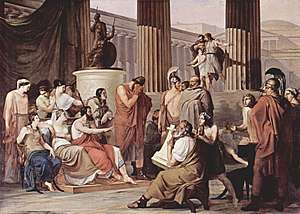Alcinous

Alcinous (/ælˈsɪnoʊəs/; Greek: Ἀλκίνους or Ἀλκίνοος, Alkínoös) was, in Greek mythology, a son of Nausithous, or of Phaeax (the son of Poseidon and Corcyra), and father of Nausicaa, Halius, Clytoneus and Laodamas with Arete.[1] His name literally means "mighty mind". He married his brother Rhexenor's daughter after Rhexenor was killed.[2]
Mythography
Argonautica
In the myth of Jason and the Argonauts, Alcinous is represented as living with his wife Arete in Drepane. The Argonauts, on their return from Colchis, came to his island, and were hospitably received. When the Colchians, in their pursuit of the Argonauts, likewise arrived in Drepane, and demanded that Jason's lover Medea should be delivered up to them, Alcinous declared that if she was still a virgin she should be restored to them, but if she was already the wife of Jason, he would protect her and her husband against the Colchians. The Colchians were obliged, by the contrivance of Arete, to depart without their princess, and the Argonauts continued their voyage homeward, after they had received expensive presents from Alcinous.[3][4][5] He was also the King of the Phaeacians.
Odyssey
According to Homer, Alcinous is the happy ruler of the Phaiacians in the island of Scheria, who has by Arete five sons and one daughter, Nausicaa.[6] The description of his palace and his dominions, the mode in which Odysseus is received, the entertainments given to him, and the stories he related to the king about his own wanderings, occupy a considerable portion of Homer's Odyssey (from book vi. to xiii.), and form one of its most charming parts.[7]
See also
- 11428 Alcinoös, Jovian asteroid named after Alcinous
References
- ↑ Schmitz, Leonhard (1867). "Alcinous (1)". In William Smith. Dictionary of Greek and Roman Biography and Mythology. 1. Boston: Little, Brown and Company. p. 102. Archived from the original on 2007-10-28.
- ↑ Homer, Odyssey, VII.54-68
- ↑ Apollonius of Rhodes, iv. 990-1225
- ↑ Orph. Argon. 1288, &c.
- ↑ Pseudo-Apollodorus, Bibliotheca i. 9. § 25, 26
- ↑ Homer, Odyssey vi. 12, &c., 62, &c
- ↑ Comp. Gaius Julius Hyginus, Fabulae 125 and 126
External links
| Wikimedia Commons has media related to Alcinous. |